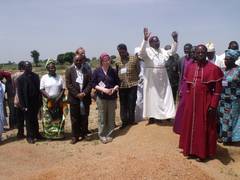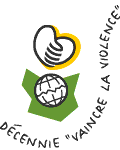WCC Living Letters team in Nigeria listens to survivors of violence, prays at mass grave

Prayer at the mass grave in Dogonahawa, led by Archbishop Michael Kehinde Stephen. Click here for high resolution
It was a deeply moving experience for the Living Letters team visiting Nigeria on behalf of the World Council of Churches (WCC) when they gathered to pray around a mass grave in Dogonahawa, near Jos, in the Central Plateau State on Tuesday. About 323 locals murdered last March have been buried at the site.
In early March 501 people, mostly women and children from two adjacent villages, Dogonahawa and Bukuru, were killed in their sleep during an outburst of communal and ethnic violence.
Dogonahawa is a hamlet of about 100 houses, all clustered in a circle. It is located just seven miles from Jos, the capital city of the Plateau State. Vestiges of the sectarian clashes still surround the people. The community has been reduced to a ghost village as only a handful of people now live there.
Some of the villagers who welcomed the Living Letters team to their devastated village said life had not been the same again for them since the tragic events.
Living Letters are small ecumenical teams visiting a country to listen, learn, share approaches and help to confront challenges in order to overcome violence, promote and pray for peace. One such team travelled to Nigeria 15-20 May.
The team also visited the nearby town of Bukuru, which was equally deserted. An entire market had been burnt and hundreds of houses and shops destroyed. The local government premises were also razed. Reconstruction work is yet to begin in most of the affected quarters of Bukuru.
Most members of the team could not hide their grief as they met with men, women and children who lost loved ones. The team offered prayers at the site of the mass grave, where many relatives of the murdered were present.
The community leader David Jik told the Living Letters delegation how he lost his children and grandchildren during the violence. A 60-year old woman, Kumbo Chuwang, who was maimed during the violence, cried and explained how she and her family members had been attacked. A teenage boy, Tebita Danjuma, showed his body, burnt in the fire that was set to engulf the buildings in the hamlet.
The Anglican Bishop of the Diocese of Bukuru Jwan B.N. Zhumbes, who accompanied the team to the villages, said several members of his church were killed in the violence, while many escaped and relocated in the wake of the crisis.
Archbishop Michael Kehinde Stephen, leader of the Christian Council of Nigeria that hosted the visiting Living Letters team, mentioned plans that were underway by the local communities to construct a cenotaph at the site of the mass grave.
Earlier in the day the team visited the Centre for Peace Advancement in Nigeria (CEPAN), an interfaith group based in Jos. Hajia Lantana Abdullahi, a Muslim woman who is the centre's programme director said her group had been working, especially with the youth, to ensure that various ethnic and religious communities live in harmony.
The chairman of the Plateau State division of the Christian Association of Nigeria, Archbishop Ignatius Kaigama, of the Roman Catholic Church, welcomed the team stating that God wants us to be one. He added that the impression that Christians and Muslims in the state were fighting is not correct. "It is not the religions that are fighting but some people who adhere to the religions that are involved. There is no war between the two faiths," he said.
The Living Letters team was received at the headquarters of the Church of Christ in Nigeria (COCIN). Addressing the delegates to the COCIN 74th General Council, Bishop Dr Robert Aboagye-Mensah, from Ghana, said Christians should work for peace and reconciliation even when they have been offended.
Aboagye-Mensah, who is the vice-president of the All Africa Conference of Churches (AACC) and a WCC Central Committee member, wondered if Christians in the state have been listening to what God is saying in the midst of the destruction they have found themselves.
Aboagye-Mensah asked: "Do we hear God's voice. What is God saying to us?" He said: "Christians have a challenge to work for peace. Peace and reconciliation begin with us. The offended one is to begin the process of reconciliation and peace."
The COCIN president Rev. Dr Pandang Yamsat affirmed the commitment of his church members to work for peace in the troubled areas, a task he sees as a prophetic witness of the church.
The Living Letters team was composed of representatives of churches and WCC staff from Ghana, Kenya, Germany, Norway, Switzerland, Finland, India and Ethiopia.
(Gbenga Osinaike, the publisher of the Church Times of Lagos, Nigeria, reported from Jos.)
More information on the Living Letters visit to Nigeria
WCC member churches in Nigeria



